De Russische schrijver en dichter Alexander Blok werd geboren op 28 november 1880 in St. Petersburg. Zie ook alle tags voor Alexander Blok op dit blog.
The night
The night. The street. Street-lamp. Drugstore.
A meaningless dull light about.
You may live twenty-five years more;
All will still be there. No way out.
You die. You start again and all
Will be repeated as before:
The cold rippling of a canal.
The night. The street. Street-lamp. Drugstore.
Vertaald door Vladimir Markov en Merrill Sparks
Here We Live..
Here we live in ancient chambers
By the water strings.
Here at spring the gladness rambles,
And the river sings.
As the gaiety’s first message,
With the first spring gales,
There will pour the blazing azure
In the doors of cells.
And quite full of sacred shudder
Of the years of dreams,
Through the fields we’ll gaily ride in
Bless of dazzling beams.
My Monastery, Where..
My monastery, where I’m badly pining,
Is granite, melted by the burning mind.
I’m strangled and blinded under this heat, lying,
And leave it, trying a new cell to find…
There’ll be still heat, but one that’s always warming.
The bloody ball will melt my brain to ash,
I’ll lose my mind in ways, the more calming,
Than in this one, oppressing blood and flesh.
Where’s the new cell? Where is my cloister, novel?
Not on the skies, the grave’s darkness behind,
But on the Earth it’s healthy one and low,
Where I’ll find all, when having lost my mind!…
Vertaald door Yevgeny Bonver
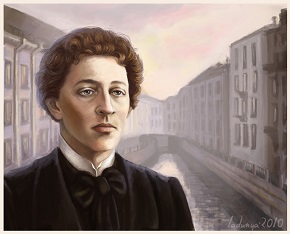
Alexander Blok (28 november 1880 – 7 augustus 1921)
Portret door Ladunya, 2010
De Amerikaanse schrijfster Rita Mae Brown werd geboren in Hanover, Pennsylvania op 28 november 1944. Zie ook alle tags voor Rita Mae Brown op dit blog.
Uit: Rubyfruit Jungle
“Okay, okay, Nancy, that’s enough. You might wear him out and we have other customers to satisfy.” That took the wind out of her and she went home. “Look, Broccoli, what’s the big idea of letting Nancy touch you for free? That ought to be worth at least a dime. We oughta let kids do it for a dime and Nancy can play for free when everyone goes home if you want her to.”
“Deal.”
This new twist drew half the school into the woods. Everything was fine until Earl Stambach ratted on us to Miss Martin, the teacher. Miss Martin contacted Carrie and Broccoli’s mother and it was all over.
When I got home that night I didn’t even get through the door when Carrie yells, “Molly, come in here right this minute.” The tone in her voice told me I was up for getting strapped.
“I’m coming, Mom.”
“What’s this I hear about you out in the woods playing with Brockhurst Detwiler’s peter? Don’t lie to me now, Earl told Miss Martin you’re out there every night.”
“Not me, Mom, I never played with him.” Which was true.
“Don’t lie to me, you big-mouthed brat. I know you were out there jerking that dimwit off. And in front of all the other brats in the Hollow.”
“No, Mom, honest, I didn’t do that.” There was no use telling her what I really did. She wouldn’t have believed me. Carrie assumed all children lied.”
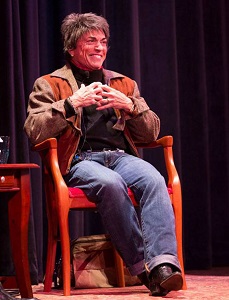
Rita Mae Brown (Hanover, 28 november 1944)
De Australische dichter en schrijver Julian Randolph Stow werd geboren in Geraldton in het westen van Australië op 28 november 1935. Zie ook alle tags voor Julian Randolph Stow op dit blog.
Uit: The Merry-Go-Round in the Sea
“When the merry-go-round was moving it gratcd under its collar. But now it was still. there were no children playing about it. only the one small boy who had climhed out of the car by the curh and stood studying the meny-go-round from a distance. his hands jammed down inside the waistband of his shorts.
Under his sandals. leaves and nuts fallen from the Moreton Bay ligtrees crunched and popped. Beyond the merry-go-round was the sea. The colour of the sea should have astounded. but the boy was seldom astounded. It was simply the sea. dark and glowing blue. hiseeted by seagullgrey timbers of the rotting jetty. which dwindled away in the distance until it seemed to come to an end in the flat-topped hills to the north. He did not think about the sea. or about the purple bougainvillaea that glowed against it. propped on a sagging shed. These existed only as the familiar haekdrop of the merry-go-round. Nevertheless. the colours had entered into him. printing a hrilliant memory.
Ile went, scufling leaves. to the merry-go-round. And hanging his body over the narrow seat he began to run with it. lifting his legs from the ground as it gained momentum. But he could not achieve more than half a revolution by this means, and presently he stopped. feeling vaguely hard-used.
His mother was in the Library. getting books. He could see her now, coming out on to the veranda. The Library was a big place with an upstairs. lt used to be the railway station in the Old Days, which made it very old indeed. In fact. everything about the merry-go-round was old. though he did not know it. Across the street the eonvict«huilt eourthouse erumbled away, sunilowers sprouting from the erueked steps.
The great stone ham at the next corner was Wainwright’s store. where the early ships had landed supplies. That. Too was erumbling, like the jetty und the eourthouse and the hougainvillaea-torn shed. like the upturned hoat on the force shore with sunllowers hlossoming through its ribs.”
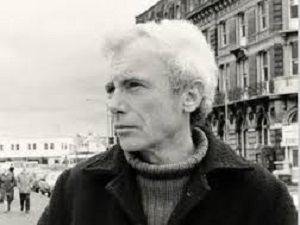
Julian Randolph Stow (28 november 1935 – 29 mei 2010)
De Franse schrijver Philippe Sollers werd geboren op 28 november 1936 in Bordeaux. Zie ook alle tags voor Philippe Sollers op dit blog.
Uit: Portraits de femmes
« On ne naît pas homme, on le devient, la plupart du temps à ses dépens. C’est un long chemin dangereux qui, le plus souvent, ne mène nulle part. On vous montre des directions, on vous les impose, c’est fou ce que le mot « homme » engendre comme bruit de valeurs. Il faut ceci, il faut cela, tenez-vous droit et marchez au pas, tu seras un homme, mon fils, comme moi j’ai été fils pour pouvoir commander des fils. Tables de la loi, catéchisme en bois, formules toutes faites, la plus sinistre étant un mannequin en képi, devant un cercueil décoré, faisant état de sa tristesse, mais aussi de sa « fierté » à l’égard d’un soldat « qui n’est pas mort pour rien, les armes à la main ».
Tableaux d’honneur, champs d’honneur, monuments aux morts, mémorials, sacrifices, bénédictions, exemples à suivre, « le vrai tombeau des morts est le coeur des vivants », transmissions, initiations, commémorations, cendres. La voie est tracée, il faut se courber, faire du sport, de la gymnastique, se pencher sur des livres, et encore des livres, que vous n’avez pas plus envie de lire que de courir à n’en plus finir. Quand tout un système s’effondre, comme aujourd’hui, ce fameux homme n’est plus qu’un délinquant précoce, un terroriste cinglé, un trader scotché jour et nuit à son ordinateur. S’il n’a pas déjà divorcé deux ou trois fois, il rentre chez lui, subit la mauvaise humeur de sa femme, les demandes tapageuses et absurdes de ses enfants, les voix hallucinées de la télévision, l’affairement autour du Net, la société, quoi, qui vit chez lui comme chez elle. Il essaye de dormir un peu, la tête pleine de chiffres ou de chèques à faire. Il a un travail, celui-là, encore heureux, il n’est pas chômeur, sans-papiers, ou sans domicile fixe. Il peut même faire partie d’une minorité influente, et croire peser (mais si peu !) dans les décisions du marché. C’est l’homme, enfin, ou ce qu’il en reste, dans la mondialisation en cours. De plus en plus de femmes se reconnaîtront d’ailleurs dans ce portrait rapide.”
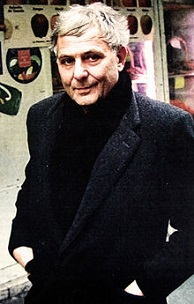
Philippe Sollers (Bordeaux, 28 november 1936)
De Engelse schrijfster Nancy Mitford werd geboren op 28 november 1904 in Londen. Zie ook alle tags voor Nancy Mitford op dit blog.
Uit: Love in a Cold Climate
“This he assembled round a splendid tower of his own designing, covered the walls of the rooms with French panelling and silks and set it in a formal landscape which he also designed and planted himself. It was all very grand and very mad, and in the between wars period of which I write, very much out of fashion. “I suppose it is beautiful,” people used to say, “but frankly I don’t admire it.”
This Lord Montdore also built Montdore House in Park Lane and a castle on a crag in Aberdeenshire. He was really much the most interesting and original character the family produced, but no member of it deviated from a tradition of authority. A solid, worthy, powerful Hampton can be found on every page of English history, his influence enormous in the West of England and his counsels not unheeded in London.
The tradition was carried on by the father of my friend, Polly Hampton. If an Englishman could be descended from the gods it would be he, so much the very type of English nobleman that those who believed in aristocratic government would always begin by pointing to him as a justification of their argument. It was generally felt, indeed, that if there were more people like him the country would not be in its present mess, even Socialists conceding his excellence, which they could afford to do since there was only one of him and he was getting on. A scholar, a Christian, a gentleman, finest shot in the British Isles, best-looking Viceroy we ever sent to India, a popular landlord, a pillar of the Conservative Party, a wonderful old man, in short, who nothing common ever did or mean. My cousin Linda and I, two irreverent little girls whose opinion makes no odds, used to think that he was a wonderful old fraud, and it seemed to us that in that house it was Lady Montdore who really counted. Now Lady Montdore was forever doing common things and mean, and she was intensely unpopular, quite as much disliked as her husband was loved, so that anything he might do that was considered not quite worthy of him, or which did not quite fit in with his reputation, was immediately laid at her door. “Of course she made him do it.” On the other hand, I have often wondered whether without her to bully him and push him forward and plot and intrigue for him and “make him do it,” whether, in fact, without the help of those very attributes which caused her to be so much disliked, her thick skin and ambition and boundless driving energy, he would ever have done anything at all noteworthy in the world. »
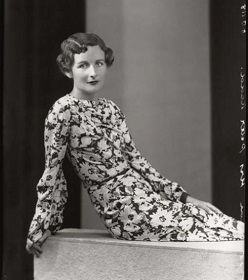
Nancy Mitford (28 november 1904 – 30 juni 1973)
Zie voor nog meer schrijvers van de 28e november mijn vorige blog van vandaag.
